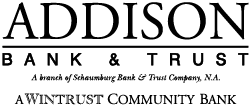The Connectivity of Community Service
5 reasons why your impact means more.
The Connectivity of Community Service
5 reasons why your impact means more.
What comes to mind when you think of the term community service? Maybe you’re conjuring images of elected officials and people in positions of authority, or maybe you’re thinking about fulfilling that experiential learning requirement for school and sprucing up your college applications with social service projects. But community service extends far beyond checking off a task, and there are many ways to give back, regardless of whether you’re in a position of power or a student filling out applications.
First, let’s break down what we mean by community. It doesn’t just mean your neighborhood or the city you live in. You are a part of multiple communities when you go to school, work your part-time job, or practice with your teammates.
“Community is not bound by geography; it is defined by connections,” says Wintrust Vice President of Community Impact Elizabeth Okey. “People can have many levels of community.”
So you’re already a community influencer every day when you clean up your classroom or stay late to help a teammate after practice. Doing community service for your larger communities, even if it seems like no big deal, makes them better than they were before. Plus, there are some great benefits in community service for you!
Here are five of them:
1. Meet new friends
Volunteering might take you out of your comfort zone, but it also puts you in contact with people you may not have met otherwise. Working together on a shared goal, like cleaning up a park, working at a soup kitchen, or serving on a youth board, is a great way to connect with someone. You already have a common interest and built-in hang-out time. You’re bound to meet some interesting people.
2. Impress colleges — or employers
It’s true that college admissions officers like to see community service experience on an application. Having a history of helping your community can strengthen your application, as colleges can see the positive impact you have on those around you. After college, or when applying for a job in general, a history of community service is a great thing to have on a resumé, especially if the service work is related to the job you are applying for.
3. Build your network
Networking is connecting with people, but unlike making friends, networking connections are usually acquaintances outside your friend group — like the volunteer coordinator at the soup kitchen, a fellow volunteer who goes to a different school, or the local shop owner you helped with a fundraiser. These connections are valuable because they could potentially be helpful to you in some way in the future, maybe as a job reference, a resource, or introducing you to new opportunities.
4. Try out a career
If you’re interested in a particular job or occupation, community service can be a great way to learn about it. Whether you’re considering a career in education, IT, government, or virtually any other field, there are volunteering opportunities that can give you an idea of what it would be like to do that every day. You may learn you love it or find out you hate it; either way, it’s valuable insight and experience that can help you make important decisions in the future.
5. Make your future community better
Taking action to improve your community does more than make you feel good in the moment. Yes, you’ve performed a service to help someone and maybe made a new connection in the process, but it’s more than that, according to Okey.
“You’re making your own future,” she says. “In 10 years, you are going to be an adult. If you don’t take action to improve your community now, who else is going to do it?”
Those actions may seem insignificant at first, but they have a larger, positive effect on your community over time.
So, that community service project at school? You got this. It’s too great an opportunity to pass up!
1. Teen Banking Club. Membership is for customers under age 22.





